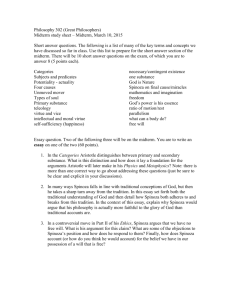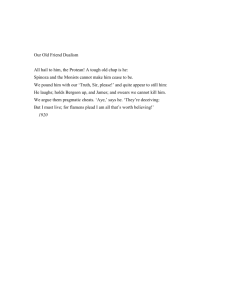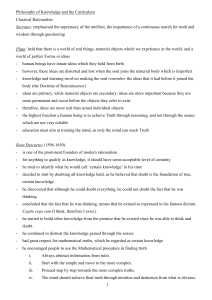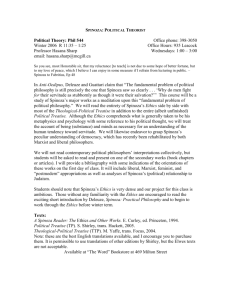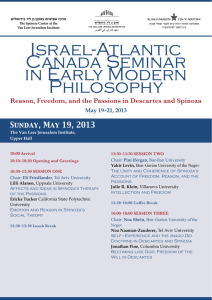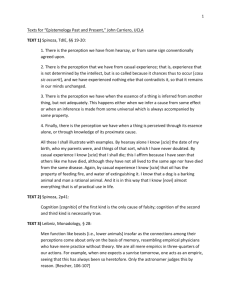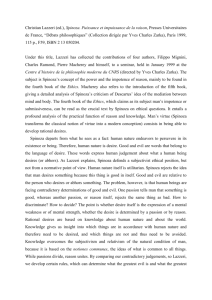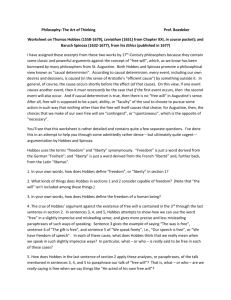Aristotle
advertisement
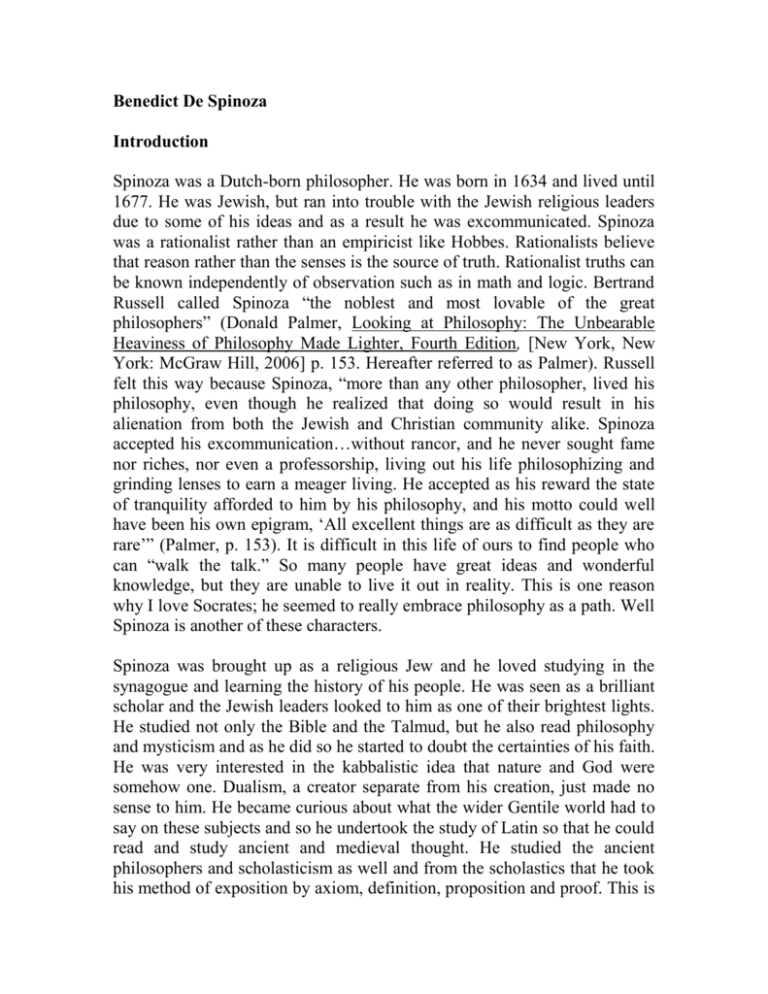
Benedict De Spinoza Introduction Spinoza was a Dutch-born philosopher. He was born in 1634 and lived until 1677. He was Jewish, but ran into trouble with the Jewish religious leaders due to some of his ideas and as a result he was excommunicated. Spinoza was a rationalist rather than an empiricist like Hobbes. Rationalists believe that reason rather than the senses is the source of truth. Rationalist truths can be known independently of observation such as in math and logic. Bertrand Russell called Spinoza “the noblest and most lovable of the great philosophers” (Donald Palmer, Looking at Philosophy: The Unbearable Heaviness of Philosophy Made Lighter, Fourth Edition, [New York, New York: McGraw Hill, 2006] p. 153. Hereafter referred to as Palmer). Russell felt this way because Spinoza, “more than any other philosopher, lived his philosophy, even though he realized that doing so would result in his alienation from both the Jewish and Christian community alike. Spinoza accepted his excommunication…without rancor, and he never sought fame nor riches, nor even a professorship, living out his life philosophizing and grinding lenses to earn a meager living. He accepted as his reward the state of tranquility afforded to him by his philosophy, and his motto could well have been his own epigram, ‘All excellent things are as difficult as they are rare’” (Palmer, p. 153). It is difficult in this life of ours to find people who can “walk the talk.” So many people have great ideas and wonderful knowledge, but they are unable to live it out in reality. This is one reason why I love Socrates; he seemed to really embrace philosophy as a path. Well Spinoza is another of these characters. Spinoza was brought up as a religious Jew and he loved studying in the synagogue and learning the history of his people. He was seen as a brilliant scholar and the Jewish leaders looked to him as one of their brightest lights. He studied not only the Bible and the Talmud, but he also read philosophy and mysticism and as he did so he started to doubt the certainties of his faith. He was very interested in the kabbalistic idea that nature and God were somehow one. Dualism, a creator separate from his creation, just made no sense to him. He became curious about what the wider Gentile world had to say on these subjects and so he undertook the study of Latin so that he could read and study ancient and medieval thought. He studied the ancient philosophers and scholasticism as well and from the scholastics that he took his method of exposition by axiom, definition, proposition and proof. This is not an easy way to follow, at least in modern times, but that does not take away from Spinoza’s profundity or influence. Spinoza was especially taken with the philosopher Bruno (1548-1600), who was burned at the stake. These ideas included “the master idea of unity: all reality is one in substance, one in cause, one in origin; and God and this reality are one. Again, to Bruno, mind and matter are one; every particle of reality is composed inseparably of the physical and the psychical. The object of philosophy, therefore, is to perceive unity in diversity, mind in matter, and matter in mind; to find the synthesis in which contradictions and opposites meet and merge; to rise to that highest knowledge of universal unity which is the intellectual equivalent of the love of God. Every one of these ideas became a part of the intimate structure of Spinoza’s thought” (Will Durant, The Story of Philosophy, [Garden City, New York: Garden City Publishing Company, 1943] p. 116. Hereafter referred to as Durant). Philosophy will spin off in many directions, but it always seems to return to this pursuit of unity amidst the multiplicity of our experience. This is such a persistent theme that one wonders if it is a basic intuitive insight of humanity or if it is just a persistent delusion! But probably no philosopher influenced him more than Descartes (15961650). As I wrote in the last lecture, all modern philosophers have to face Descartes, just as they have to face Plato and Aristotle. What stands out in Descartes is the primacy of thought. I can doubt everything, even the physical world, but I can’t doubt my ability to doubt. “I think, therefore I am.” But probably what most stimulated Spinoza was not the problem of knowledge but Descartes insistence that the universe could be explained in scientific and mechanical ways except for the soul and God. In other words, there were two basic substances for Descartes, often portrayed as mind and matter. As much as Spinoza respected Descartes, he felt that Descartes had fallen into a dualism that resulted in the mind/body problem. Descartes had said that there is only one infinite substance, which by definition is God. But then he went on to talk about finite substances. Spinoza felt this was inconsistent and therefore did not make sense. Therefore Spinoza held on to the idea of one infinite substance. But when you do this then everything becomes a part of the divine, even nature. When a person believes that God = nature then they are called a pantheist, “God is all things.” It was this thought that brought Spinoza into trouble with both Jewish and Christian theologians. The Ethics Descartes had suggested that philosophy needed to be as clear and precise as math. Spinoza took this to heart. Spinoza wanted to take the chaos of conflicting ideas and bring them together in the unity he so much loved. The form he chose was the scholastic, logical format that does simplify things to a certain extent, but also makes them very difficult to follow or get into if you are not a mathematician. “In short, Spinoza is not be read, he is to be studied; you must approach him as you would Euclid, recognizing that in these brief two hundred pages a man has written down his lifetime’s thought stoic sculptury of everything superfluous” (Durant, p. 130). Spinoza is a philosopher’s philosopher in that it takes a certain amount of training to really follow his argument. But we will attempt to give a brief outline of his major work. Spinoza introduces three important terms that he will keep using: substance, attribute, and mode. “A mode is any individual thing or event, any particular form or shape, which reality transiently assumes; you, your body, your thoughts, your group, your species, your planet, are modes; all these are forms, modes, almost literally fashions, of some eternal and invariable reality lying behind and beneath them” (Durant, p. 131). The question is always the same: What is this reality? Spinoza used the word “substance,” which he took over from the scholastics. Ever since then there has been argument about what he meant. But the root of the word seems to go back to the Greek understanding of the verb “to be.” Substance is that which is, the inner essence of something. The word sometimes has too much of a physical connotation. When Spinoza talks about a substance he is not talking about how the material of a book is paper and ink; rather he is talking closer to what we mean when we ask someone to sum something up, such as “What was the substance of the film?” “It betokens the very structure of existence, underlying all events and things, and constituting the essence of the world” (Durant, p. 131). Eventually substance seems to be just another way of referring to nature and God. Spinoza also makes another clarification by showing that the world can be experienced in two different ways. There is an active process that gives birth to the world as we know it and there is a more passive process that is the form of the world. Substance is properly identified with this creative unfolding rather than any specific form that is taken. Substance is not any particular flower. It is closer to the life force that expresses it self in the flower. The flower itself is a mode. It is temporary. But what goes on? If you walk into a beautiful garden you will see life bursting out all over the place. But individual things are dying off, blooms fade, leaves drop, but life goes on. The life is the substance and the flowers are the mode. When people confuse these two terms they oversimplify what Spinoza was saying. When Spinoza equates God and nature he is not saying that the divine force of all creation is this specific flower or that specific tree. The forms substance takes do not limit God and nature. So by substance Spinoza seems to be close to what the Chinese mean by the Tao. The Tao is not specific things, but it manifests in all things. It can’t be defined or limited, but it can be recognized. While God is not material or physical nature, there is a sense in which the laws of God and the laws of nature are the same. But once you say this then you are moving toward determination in the argument about whether humans are free or determined. For if God manifests as law rather than as a personal will what happens in the world follows the orderly laws of nature rather than the whim of a heavenly monarch. “The mechanism which Descartes saw in matter and body alone, Spinoza sees in God and mind as well. …Because we act for conscious ends, we suppose that all processes have such ends in view; and because we are human we suppose that all events lead up to humanity and are designed to subserve his or her needs. But this is an anthropocentric delusion, like so much of our thinking. The root of the greatest errors in philosophy lies in projecting our human purposes, criteria, and preferences into the objective universe” (Durant, p. 133). One of the lessons some people find in the Book of Job in the Bible is that the ultimate reality of the universe does not see things through human eyes and expectations. Our finite minds cannot expect to understand the infinite. One consequence of such an understanding was Spinoza’s firm understanding of relativism and subjectivity. So many of the things we declare good are simply so because we like them. Music might be good for someone who is cheerful and it might feel oppressive to someone who is depressed and it might be neutral to someone else. The music itself is not good or bad, but it is our perception that makes it so. Spinoza says that this is true of even the larger issues of good and evil, not simply taste. We declare certain things good and others evil, but all of our judgment is based on a limited and partial view of everything going on. We might and probably would have a whole new view on things if we could see with the eyes of infinity. One simple example of this comes from the world of ecological studies. What might seem like an evil, such as a forest fire, is then shown to play a significant and even healthy purpose in the long-range health of an ecosystem. Spinoza also had to tackle the body/mind problem that has plagued Western philosophy. How can we understand two such things that appear so different, that is, material reality and what comes across as immaterial and spiritual, or at least nonphysical? Spinoza wants to hold onto his unity at all costs and so he insists that they are not two things but are simply experienced as two things. If we go deeper, according to Spinoza, we will find that they are one and the same. This is still a difficult concept to grasp, but it will help to remind ourselves that we still do not have a clear understanding of how the brain and consciousness function. But there is a growing awareness, seen in practical areas like medicine, that we are psychosomatic individuals. For example, when we treat the mind we treat the body, and when we treat the body we treat the mind. To ignore this connection is apparently only at our own peril. Spinoza seems to be intuiting the same thing, but long before the Western world was ready to listen. Spinoza’s understanding of the human psyche in this way also plays into his ideas about free will and determinism. What we take for will and choice is simply the manifestation of desires. But what we don’t understand is where these desires that furnish our motivation come from. “The decisions of the mind are nothing save desires, which vary according to various dispositions. …Men think themselves free because they are conscious of their volitions and desires, but are ignorant of the causes by which they are led to wish and desire. Spinoza compares the feeling of free will to a stone’s thinking, as it travels through space, that it determines its own trajectory and selects the place and time of its fall” (Durant, p. 136). This is something that psychology is very interested in as well. For example, you might like a certain sport such as baseball. But why? Is it truly a free choice or is because of the conditions of your life gave you positive reinforcement for this sport and not for some other activity such as ballet? We take our likes and dislikes very seriously. They seem to be a big part of who we are. But Spinoza wants us to ask where our basic likes and dislikes originally came from? How free are we really? What does all of this have to do with ethics? Well we are still working our way there! First Spinoza needed to discuss the meaning of God and nature, seeing them as one and the same as long as we take substance to be that which is essential. Then he tackles the mind/body problem by saying the experience of dualism is an illusion. There is no problem because they are really one. But Spinoza has one last step. He needs to understand the human emotions and passions that control so much of what we do. And he says it needs to be studied mathematically, that is we need to be precise and identify in the chaos of human emotions the underlying laws that are at work. In this sense it is interesting to note that his descriptions of humanity are considered profound and unequaled. Part of his strength is that he does not see the human passions as a problem, but simply as data. He writes: “I have labored carefully not to mock, lament or execrate, but to understand, human actions; and to this end I have looked upon passions … not as vices of human nature, but as properties just as pertinent to it as are heat, cold, storm, thunder and the like to the nature of the atmosphere” (Durant, p. 137). It is this lack of judgmentalness and objectivity that makes Spinoza so refreshing. So many us live with too much guilt and shame because of our emotions and feelings. We treat them as personal faults rather than as simply data to be observed and gathered. One of the healing aspects of therapy for so many people is that they are able to talk and discuss things that normally they feel they have to hide. Spinoza was an acute psychologist. When it comes to ethics there seem to be three general outlooks. That of religious leaders like Jesus and the Buddha tend to emphasize love and equality and that of secular philosophy like Machiavelli and Nietzsche tend to focus on power and ethics is simply the use of power by those who can handle it. Finally there are a number of philosophers like Socrates and Plato who tend to see ethics as something that can be developed and essentially practiced only by the wise and mature. But Spinoza tried to close the gap between these three ways of looking at things. “It is the distinction of Spinoza that his ethic unconsciously reconciles these apparently hostile philosophies, weaves them into a harmonious unity, and gives us in consequence a system of morals which is the supreme achievement of modern thought” (Durant, p. 137). We will see that the key to this reconciliation is acceptance. For Spinoza happiness is the goal of our conduct but he is careful to not make happiness or suffering an absolute. They are relative and always in transition. But to the extent we move toward our potential we gain in happiness and to the extent we move away we gain in suffering. As a result his ethical theory is based on a benign egoism that says ethics should be based on what promotes my happiness. Spinoza writes: “Since reason demands nothing against nature, it concedes that each man must love himself, and seek what is useful to him, and desire whatever leads him truly to a greater state of perfection; and that each man should endeavor to preserve his being so far as in him lies” (Durant, p. 138). But the key to an enlightened egoism is understanding. Spinoza believes (like many religious people) in the power of love to overcome hate, but he does not get there through religion but through philosophy. In that sense his ethic is more Greek than Jewish or Christian even though it often sounds the same because it ends up in the same place. When we are under control of our passions we often feel the most alive, but this is also when we make the most mistakes because we cannot see clearly. The goal is to see clearly through the power of reason. How is Spinoza adding something different than the Greek philosophers? He is not advocating reason against the passions. He has a friendlier attitude toward the passions. He thinks the passions without reason are dangerous, but he also thinks that reason without passions is useless and ineffective. So what we need is to bring thought to our passions and let our passions inform our thought. Only when the two work together can we act in an intelligent manner and for Spinoza, intelligence is the marker of virtue. “All intelligent behavior--i.e., all reaction which meets the total situation--is virtuous action; and in the end there is no virtue but intelligence” (Durant, p. 140). Socrates thought knowledge was virtue and then Bacon came to see knowledge as power. With Spinoza we come back to the Greek ideal of knowledge being the source of virtue. To see things as they truly are will lead us to make better, more ethical decisions. In Spinoza’s metaphysics, reason consisted of being able to see the laws that underlay the chaotic flux of life. So in his ethics, virtue is the ability to bring the law into the world of desires. The goal is to understand and see how our desires work so that we are not victims of their confusion. Spinoza writes: “By imagination and reason we turn experience into foresight; we become the creators of our future, and cease to be the slaves of our past” (Durant, p. 141). Our freedom as human beings is not in the area of being free from the laws that constrain our lives. All of that is determined. Our freedom, rather, springs from our bringing understanding and reasoning to our passions so that we understand the laws we live under and can work with them rather than against them. “We are free only where we know” (Durant, p. 141). Spinoza believed that when we are guided by reason we will naturally seek out not only what is best for us, but also what is best for others. In this sense he is much more optimistic than someone like Hobbes! So our wills are not really free. Our actions are determined by how our passions play on us. Our freedom lies in how we accept and work with our passions rather than simply let them mindlessly take us wherever they want to go. It is similar to the idea that our real freedom lies more in our attitudes than in what we do. Our happiness lies so much more in how we choose to respond to what happens to us then in trying to control all of the things in which we really have no control anyway. We waste so much of our energy trying to control things. When we fail we experience the negative emotions of anxiety, frustration, anger, and depression. Spinoza wants us to use philosophy to free ourselves from such negative emotions because they drain our vital energy and do us no good. Reflections on Spinoza You will find a real stoic element in Spinoza. Things are determined, but they are not chaotic; they are lawful. Our job is to bring our intelligence to bear so that we can understand what we are working with. But if you can just accept what happens then you don’t need to fight it. So much of our misery comes from resisting what is happening and then trying to manipulate things to go the way we want. But since that is not going to happen, according to Spinoza and the Stoics, then our real happiness lies in understanding the inevitability of things and learning to relax. Spinoza wrote: “The greatest good is the knowledge of the union which the mind has with the whole nature” (Durant, p. 143). If you are a drop of water in a river then where is your freedom? For Spinoza, the human is simply one part of great nature. When we see things from the river’s perspective we will not suffer the limited perspective of the drop being tossed and turned as it is carried down the river. Our wholeness comes not from being an individual drop but from being a part of the river and from consisting of the same H20 as any other drop of water. All water shares the same wetness. Spinoza last proposition in his book states: “Blessedness is not the reward of virtue, but virtue itself” (Durant, p. 137). The truly virtuous person does not look for a reward. Doing the good is its own reward. Ethics, then, is not a set of rules, but the actions of a virtuous person. And virtue is the result of bringing the mind into relationship with the emotions. Spinoza felt that “the true philosopher attempts to transcend the purely human perspective and view reality from the perspective of reality itself. From this perspective, one comes to realize that the human has no privileged position in the cosmos; the human has no more and no less dignity than anything else in nature. One must come to love everything, which is to say, to love God (because one must either love everything, or nothing at all). The love of God is tantamount to the knowledge of God, which is to say, a philosophical knowledge of reality. …[This philosophic knowledge] also contains a stoic component insofar as knowledge of reality leads one to realize that everything that happens, happens of necessity. There is no randomness and no freedom of will. But the realization that there is no such thing as free will, neither for God of for humans, can itself be a liberating realization because one is thereby freed from the demands of desire and passion, both of which…manage to control us only because of our failure to grasp the rational structure of reality. With knowledge, these emotions can be transformed into clear and distinct ideas leading to a kind of blessedness and joy. Spinoza wrote: ‘There cannot be too much joy: it is always good: but melancholy is always bad’” (Palmer, pp. 156-157). Much of our depression is caused by our wanting things to be different than they are. Joy comes from loving things as they are. You have to love a philosopher whose philosophy leads us to joy! It is now time to turn to France to learn about one of the great philosophical characters of all time. He was a philosopher who was at the forefront of the European Enlightenment and thus a huge influence on the founders of the United States, the one and only Voltaire.
